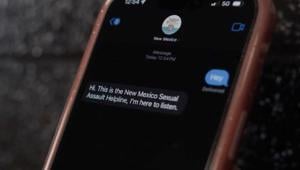URGENT UPDATE: The New Mexico Sexual Assault Helpline just celebrated its first anniversary, responding to over 1,200 inquiries in its inaugural year. This significant milestone underscores the helpline’s crucial role as a lifeline for survivors of sexual assault, according to Alexandria Taylor, executive director of the New Mexico Coalition of Sexual Assault Programs.
Established on October 21, 2024, with support from the state Crime Victims Reparation Commission and Health Care Authority, the helpline operates 24/7, providing free and confidential assistance via phone, text, and online chat. “For many, this is the first time they are voicing their experience,” Taylor emphasized, highlighting the emotional weight of reaching out for help.
As the helpline marks this pivotal occasion, it revealed its response data: the team engaged in 1,141 phone calls, 90 online chats, and 50 text messages throughout the past year. Callers hailed from 25 counties across New Mexico, with interactions lasting anywhere from 30 seconds to two hours and 50 minutes.
The initiative to create a statewide sexual assault helpline began in 2020, driven by isolation during the COVID-19 pandemic and findings from stakeholder discussions and assessments. Alarmingly, a coalition survey revealed that 54% of New Mexicans reported experiencing sexual assault or rape in their lifetime, with 68% not receiving professional help.
In an analysis of the helpline’s engagements, approximately 80% of individuals contacted were seeking someone to talk to, while around 20% requested referrals for services such as sexual assault nurse examinations or counseling. Rachel Cox, deputy director of programs, stated, “This data reveals that connection and support are vital for survivors in New Mexico.”
The helpline’s team consists of seven responders and two co-directors, all of whom have undergone 120 hours of training in diverse fields from nursing to grief support. The helpline prioritizes inclusion and accessibility, offering services in both English and Spanish, with additional language interpretation available.
Taylor assured users that the helpline respects their privacy. “We collect no personal data unless voluntarily shared,” she affirmed, reinforcing the commitment to confidentiality. All interactions are conducted by trained responders, ensuring a human touch without any recording or artificial intelligence involvement.
To amplify awareness of the helpline, the New Mexico Coalition of Sexual Assault Programs has launched a public awareness campaign featuring local actor Amanda Machon. The campaign includes engaging public service announcement videos and a coaster program for local restaurants and bars, inviting patrons to share the helpline’s contact information.
The coalition will host a celebration event on October 27 from 6 to 8 p.m. at Tractor Brewing Wells Park in Albuquerque. The event is free and open to the public, with RSVPs available online.
Looking ahead, Taylor is seeking continued support from the New Mexico Legislature, requesting $1 million in recurring funding to sustain the helpline’s operations. “We are not yet in a place where sexual violence is eradicated in New Mexico,” Cox cautioned. “However, the helpline offers a vital shift from isolation to connection and support for survivors.”
As the helpline moves into its second year, the focus remains on ensuring that every survivor feels empowered to reach out, knowing they will receive the compassion and understanding they deserve.







